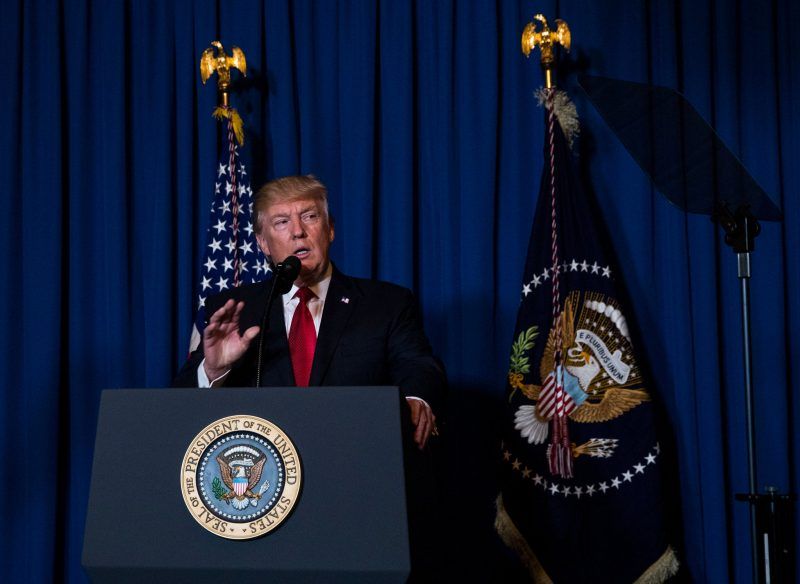
After President Bashar al-Assad of Syria once again attacked his own citizens with poison gas, the civilized world recoiled in horror at images of children writhing in pain and suffocating to death. President Trump voiced this justified outrage at a news conference on Wednesday, and the next day he took swift, decisive action against the outlaw Assad regime. But these strikes did more than simply punish Mr. Assad and deter future attacks; they have gone a long way to restoring our badly damaged credibility in the world.
It’s hard to overstate just how low the standing of the United States had fallen because of President Barack Obama’s failure to enforce his own “red line” against Mr. Assad’s use of chemical weapons in 2013. I was one of the few Republican members of Congress who supported strikes against Syria then. Because of that, I’ve heard from dozens of world leaders expressing their doubts about the security commitments of the United States.
These doubts originated from surprising places. Of course our longtime Arab allies expressed their misgivings. Yet European and even Asian leaders have privately wondered to me whether the red-line fiasco called into question America’s security alliances in their regions. While far removed from the Middle East, they still depend on the United States and the threat of force to defend our mutual interests.
It wasn’t only Mr. Obama’s refusal to act in the moment that undermined our credibility. The fig leaf to justify inaction was an agreement with President Vladimir V. Putin of Russia to remove Syria’s chemical weapons, which Russia and Syria plainly violated from the outset. Yet Obama administration officials continued to celebrate it as a triumph.
It’s also worth remembering that Mr. Obama backed down partly because he so badly wanted a nuclear deal with Mr. Assad’s patron, Iran. But his weakness in Syria only emboldened Iran, ultimately producing a worse deal while encouraging Iran’s campaign of imperial aggression in the region, support for terrorism and human rights abuses.
In one night, President Trump turned the tables. He showed the world that when the United States issues a warning, it will back up its words with action. There was no hand-wringing, no straw-man choice between doing nothing and launching a massive ground invasion, no dithering for consultations with others who do not have the power to act. The American president voiced his disapproval, conducted an orderly and secret process at the National Security Council, and then delivered a retaliatory strike many years overdue.
The world now sees that President Trump does not share his predecessor’s reluctance to use force. And that’s why nations across the world have rallied to our side, while Russia and Iran are among the few to have condemned the attack.
The threat of the use of force — and its actual use when necessary — is an essential foundation for effective diplomacy. Mr. Obama’s lack of credibility is one reason the United States watched in isolation as Russia and Iran took the lead at recent Syrian peace conferences. It’s also why Iran got the better of us in the nuclear negotiations and North Korea has defied us for years.
With our credibility restored, the United States can get back on offense around the world. In Syria, Mr. Assad knows that we have many more Tomahawk missiles than he has airfields. So do his supporters in Moscow and Tehran.
Further, leaders in Iran must now question the risks of being put “on notice” earlier this year by President Trump. After all, Defense Secretary Jim Mattis and C.I.A. Director Mike Pompeo are noted Iran hawks. If they recommended decisive action in Syria, the ayatollahs have to wonder if they may be next.
It’s also telling that the strikes in Syria occurred while President Trump dined with President Xi Jinping of China. The president has repeatedly expressed his concerns about North Korea and stressed that he expects China to restrain Pyongyang. Secretary of State Rex Tillerson has stated that the threat of North Korea is “imminent” and “the policy of strategic patience has ended.” Whatever Kim Jong-un may think, it’s safe to say that Mr. Xi finally takes seriously American concerns.
Finally, Russia’s geopolitical standing has taken a severe blow. Mr. Putin was powerless to protect his client in Damascus. Moscow now faces a Hobson’s choice of empty words of condemnation or escalation on behalf of a global pariah, which risks further American action. After years of Russian aggression being met by empty American words, the roles are reversed: Russia is wrong-footed and Mr. Putin finds his credibility at stake.
In every theater, President Trump now has the opportunity to press our advantage and protect our interests with strong diplomacy backed by America’s restored credibility. It’s been a long time coming, but friend and foe alike have been reminded that the United States not only possesses unmatched power, but also once again will employ our power to protect our interests, aspirations and allies.
Tom Cotton is a Republican senator from Arkansas.
